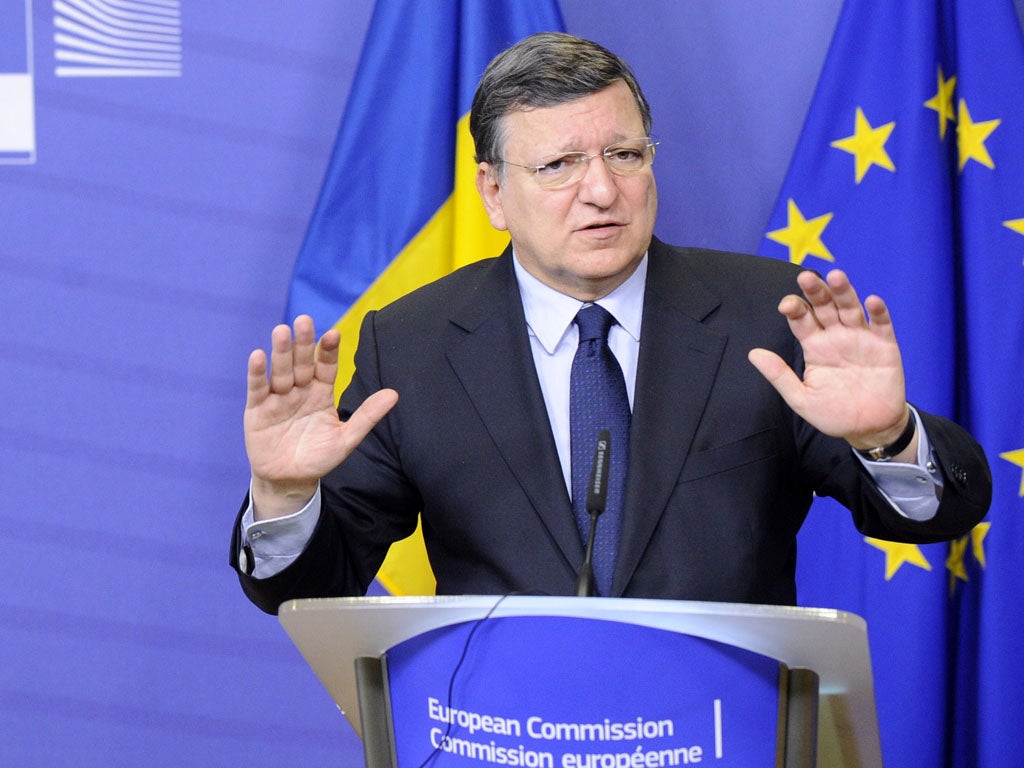Nigel Farage: Surprise, surprise, Brussels is weighing into the Scottish debate
The EC president, José Manuel Barroso, revelled in the attention he received

José Manuel Barroso, the EU Commission president, made rather light work of causing headlines when interviewed by the BBC on Sunday. His revelations that the Prime Minister has yet to put any renegotiation proposals to the EU, as well as categorically stating that free movement of people within the EU was here to stay, caused shockwaves within eurosceptic camps. The press, however, largely didn’t care. Instead, they ran with the news that Mr Barroso could not guarantee that an independent Scotland would be permitted into the European Union, something the europhile Scottish National Party was counting on. This blow came only days after Chancellor George Osborne had stated that there would be no “sterling zone” with England should the Scots vote to end three centuries of union.
I personally find it hard to believe that the expansionist EU would try to keep anyone out of its empire, let alone a country which has been part of the club since 1973 and is headed by a government that has been increasingly expressly europhile. The notion that Kosovo would probably be able to join, that Turkey is welcome and Serbia can sit at the table, while Scotland would find it “difficult, if not impossible” to sign up post a “yes” vote, I find, frankly, implausible.
This had me wondering about the strategy for this referendum, which is largely being played out in headlines. Voters in Scotland want to be sure that they will not be “isolated”. They haven’t been reassured that countries can flourish outside the EU, that independence should be synonymous with “liberated”. Indeed, looking at the behaviour of the SNP ministers, “liberal” is not a word which ever springs to mind. The withdrawalist argument is nowhere near as advanced as it is in England and Wales because they have been dealing with this faux “independence” from Westminster, but not Brussels.
Mr Barroso knows that Cameron, Clegg and Miliband are his allies in countering those who seek independence from the EU. He knows that they can be relied upon to push stories such as the EU being responsible for 3.5 million jobs in the UK. And he knows that these parties form the Better Together movement, fighting for a “no” vote in the Scottish referendum.
Could we have seen on Sunday the result of some “mutual back-scratching”, with leaders of the Establishment parties asking for a favour from Mr Barroso over the Scottish Question in return for their devotion to the EU project? With opinion polls showing more people favouring withdrawal, particularly if the matter of immigration is not addressed (which it can’t be), europhiles can’t afford to rest on their laurels.
One thing is for sure, and that’s that Mr Barroso revelled in the limelight on Sunday. Some of you may remember that there was a poll, years back, asking people to vote for the most powerful person in the UK. It was won, much to most people’s surprise – and with a definite dose of disappointment – by the EC president, after an online campaign to make a point about where our laws predominantly come from. The result was derided by MPs and commentators and yet, a few years down the line, the power he holds in this country is evident.
The EU has never shied away from interfering in international issues. It throws itself fully into “yes” campaigns on EU treaties and is not afraid to use taxpayers’ money to campaign for their side of the argument. Yet it tends to stay out of national issues for fear of proving eurosceptics right when we talk about the unelected power they hold to meddle in national affairs. Until now.
With the European elections getting closer and the Establishment realising that the threat from Ukip affects them all, not just disenfranchised Conservatives, I expect to see more cosying up in the coming months.
Follow the Germans on speed limits. There, I said it
Readers of this column are probably aware of the amount of travelling I do, particularly around the UK. Thus, when I heard about new proposals to reduce the speed limit on certain roads, I was appalled. I already think the speed limit is an arbitrary figure which does nothing to stop traffic congestion or accidents. During certain times of the day, people would love to be able to reach 70mph. At night, when the roads are quiet, it is stupid and frustrating to make journeys longer by imposing this maximum. Germany has a superb safety record on its autobahns, despite many stretches having no speed limits whatsoever.
It has been announced that a stretch of the M3 between Surrey and Hampshire, in addition to the 32-mile stretch of the M1, will be monitored by “stealth” cameras, which will do little more than cash in on motorists clocking more than 60mph. Much like energy bills, these new regulations are down to carbon emissions and green rules. On our roads we already see cameras, speed traps and police cars sitting in wait to impose fines on motorists. Shouldn’t they be focusing on serious criminal matters instead of fleecing drivers left, right and centre?
Twitter: @Nigel_Farage
Join our commenting forum
Join thought-provoking conversations, follow other Independent readers and see their replies
Comments
Bookmark popover
Removed from bookmarks